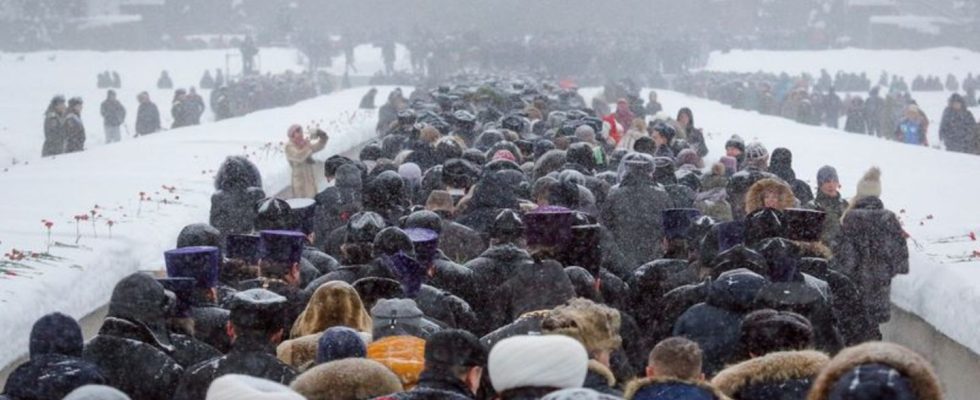Leningrad blockade
Russia wants money for non-Jewish victims
At the Piskarevskoye cemetery in St. Petersburg, the dead of the Leningrad blockade are buried in mass graves. photo
© Dmitri Lovetsky/AP/dpa
Many survivors of the Leningrad blockade 80 years ago need help in old age. Moscow stands up for them – with appeals to the Germans’ guilty conscience and nasty swipes at Ukraine.
Russia continues to pressure Germany to pay compensation to non-Jewish survivors of the blockade Leningrad in World War II. The siege of the Soviet city by Nazi troops from 1941 to 1944 is considered a major war crime with around 1.1 million civilian casualties. Many of them starved or froze to death.
From the federal government’s perspective, the compensation for non-Jewish victims was regulated with the reparations to the Soviet Union immediately after the war, as the Foreign Office says. An aid project for blockade victims in what is now St. Petersburg, which was approved in 2019, will continue despite the Russian war of aggression against Ukraine.
The spokeswoman for the Foreign Ministry in Moscow, Maria Zakharova, addressed the Russian demand several times this year. In July she criticized the fact that Jewish blockade victims were being compensated individually, but Russian and other victims were not. She spoke of “racial discrimination.” And she called this an example of nationalism taking root in Western societies and also a refusal to acknowledge the “Nazi nature of the Kiev regime” – as literally stated in the newspaper “Rossiyskaya Gazeta”.
Letter to the Chancellery
The denigration of the Ukrainian leadership and its supporters as alleged Nazis is currently the typical tone of propaganda in Russia. Moscow has now been waging a war of aggression against Ukraine for 22 months.
In a letter to the Chancellery in September, Russian Leningrad veterans accused Germany of applying double standards. All survivors should receive compensation. You spoke of currently 60,000 people. “The Nazis’ cruel plan to destroy all residents of indomitable Leningrad through hunger and cold made no distinction between nationalities,” the letter said, according to the Tass agency. In November, Sakharova called the negative response from Berlin “unacceptable and unconvincing.”
The federal government has stated its position several times. “The blockade of Leningrad is one of the many terrible German war crimes in the war against the Soviet Union, which must continue to be remembered,” it says.
Aid project for twelve million euros
The unequal treatment of the victims is justified by the increased risk that Jews were exposed to in encircled Leningrad. Because the Nazis persecuted all Jewish life, they would have faced certain death if they were caught by German forces. According to agreements with the Jewish Claims Conference, Jewish survivors have been able to receive one-off payments since 2008. Monthly pension payments were also agreed in 2021.
In contrast, the rest of the population in besieged Leningrad falls under general international law, the federal government argues. The people should have been compensated by their own country, i.e. the Soviet Union, with the help of reparations from defeated Germany. “The former Soviet Union collected a significant amount of reparations and renounced further German reparations payments in August 1953.”
In order to show good will towards the non-Jewish blockade veterans, the then Foreign Minister Heiko Maas (SPD) announced an aid project for twelve million euros in 2019. This was used to modernize a clinic in St. Petersburg that treats many of the very elderly people. Encounters between the younger generation and veterans are also encouraged. The project continues, even if Germany is now classified as an “enemy country” by Russia.

